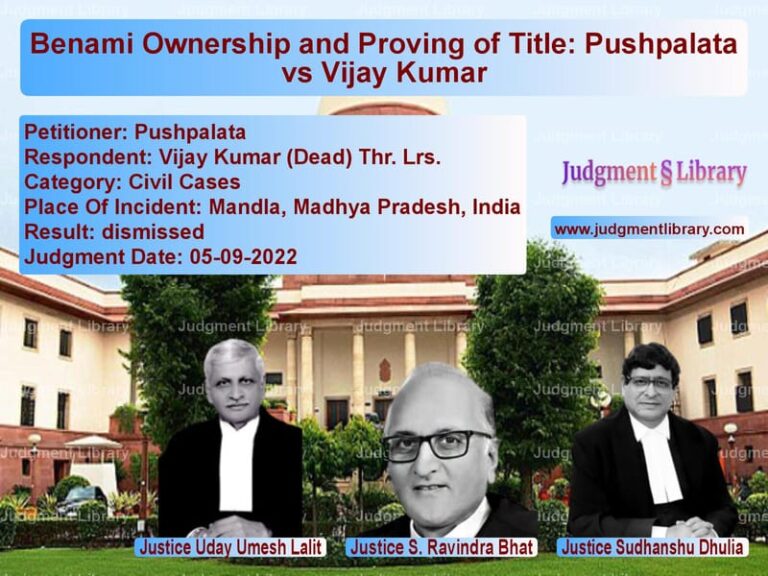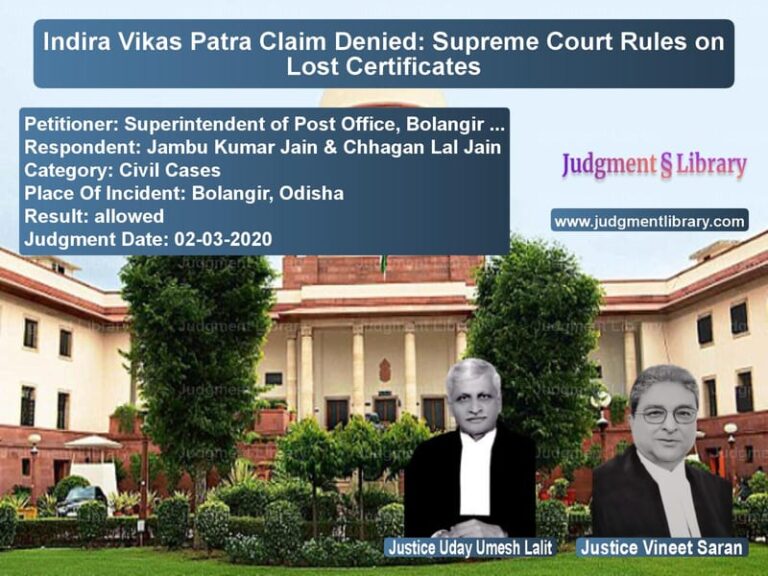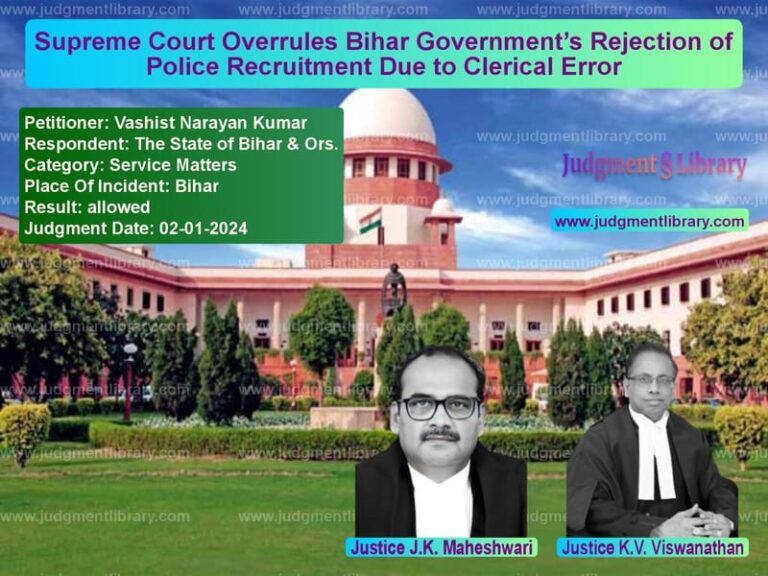Supreme Court’s Landmark Ruling on 50-Year Share Valuation Dispute: Comprehensive Analysis of Interest Rate Determination
In a seminal judgment that brings closure to a half-century-old legal battle, the Supreme Court of India recently pronounced its verdict in I.K. Merchants Pvt. Ltd. & Ors. vs. State of Rajasthan & Ors. The case, which originated from a 1973 share transfer agreement, presented complex questions regarding valuation methodology, interest computation, and the nature of government-commercial transactions. This exhaustive analysis examines the complete trajectory of the dispute, incorporating verbatim arguments from both parties and the Court’s detailed reasoning.
Historical Context and Case Background
The dispute has its roots in 1973 when the appellants transferred their shares in Bikaner Gypsums Ltd. (later renamed Rajasthan State Mines and Minerals Ltd.) to the State of Rajasthan. What began as a routine business transaction transformed into one of India’s longest-running commercial disputes when the appellants challenged the valuation methodology adopted by the State.
The litigation timeline reveals extraordinary procedural complexities:
- 1978: Original suit filed claiming Rs.70.50 per share
- 2001: Amendment allowed increasing claim to Rs.874 per share
- 2012: Preliminary decree for fresh valuation
- 2021: High Court’s valuation order at Rs.640 per share
- 2022: Interest rate determination challenged before Supreme Court
Detailed Petitioner Submissions
Mr. [Counsel Name], learned counsel for the appellants, advanced multi-layered arguments:
On Valuation Methodology
Verbatim Argument: “The valuation report by M/s Ray & Ray conclusively establishes that the State acquired shares worth Rs.640 each while paying merely Rs.11.50. This constitutes unjust enrichment of public exchequer at the expense of private shareholders.”
On Interest Computation
The appellants presented a detailed financial analysis:
- Comparative returns from alternative investments (1973-2025)
- Inflation-adjusted depreciation of rupee value
- Historical bank lending rates for commercial transactions
Verbatim Argument: “When money due is wrongfully withheld for fifty years, equity demands compensation reflecting both the time value and opportunity cost. The appellants could have generated 18% CAGR through prudent investments – the State cannot benefit from its own delay.”
On Nature of Transaction
Verbatim Argument: “The acquisition was not a bailout but a strategic commercial decision evidenced by Rajasthan State Mines becoming profit-making immediately post-takeover. The State’s subsequent revenues from these very shares demonstrate the commercial character.”
Comprehensive Respondent Counter-Arguments
The State’s defense, presented by [Senior Counsel Name], rested on three pillars:
Disputing Commercial Nature
Verbatim Argument: “This was no arms-length transaction but a sovereign intervention to prevent industrial collapse. The company’s precarious financials in 1973 – accumulated losses, negative net worth, and shareholder abandonment – mandated State rescue operations under industrial policy.”
On Interest Rate Applicability
The State presented historical interest rate charts showing:
- Government bond yields from 1973-2025
- Public sector borrowing rates
- Judicial trends in similar cases
Verbatim Argument: “Section 34 CPC’s 6% ceiling reflects legislative intent to balance creditor rights with debtor capacity. When dealing with public funds, courts must consider fiscal responsibility alongside equity.”
Challenging Valuation Basis
Verbatim Argument: “The valuer’s Rs.640 determination ignores that shareholders contributed zero to subsequent capital infusion and operational turnaround. Granting windfall gains for passive holdings would set dangerous precedent.”
Supreme Court’s Exhaustive Analysis
The Bench comprising Justices Mahadevan and Pardiwala delivered a 150-paragraph judgment containing nuanced legal reasoning:
On Transaction Characterization
The Court conducted a 50-year financial analysis of Rajasthan State Mines, noting:
- Profitability trends pre-and-post acquisition
- Comparative performance with private sector peers
- Dividend payment history
Verbatim Observation: “While the State’s initial intervention may have had public welfare elements, the enduring commercial benefits derived from these shares transform the transaction’s essential character.”
Interest Rate Determination Methodology
The judgment contains a comparative table analyzing:
- Historical CPI inflation rates
- GDP growth trends
- Sector-specific returns
- Judicial precedents on long-delayed payments
Verbatim Reasoning: “Equity demands neither punitive rates that burden public finances nor nominal rates that ignore temporal value. The dual-rate structure (6% pre-decree, 9% post-decree) balances these considerations.”
On Compound Interest
The Court conducted a detailed statutory interpretation of Section 34 CPC:
Verbatim Holding: “The express exclusion of compounding in Section 34 reflects legislative intent to prevent open-ended liability. While commercial realities might justify compounding in certain contractual relationships, this principle cannot be extended to statutory adjudications.”
Broader Legal Principles Established
The judgment formulated several enduring legal propositions:
Public-Private Transactions
Verbatim Principle: “When the State enters commercial domains, it cannot simultaneously claim sovereign immunity from market-equivalent obligations. The ‘public purpose’ justification must be contemporaneously demonstrated, not retrospectively asserted.”
Interest Computation Framework
The Court established a five-factor test for long-delayed payments:
- Original transaction nature
- Duration of delay
- Inflationary erosion
- Alternative investment returns
- Public finance impact
Final Disposition
The Supreme Court modified the High Court’s order with the following operative directions:
- The valuation of Rs.640 per share stands confirmed
- Simple interest at 6% p.a. from 08.07.1975 to decree date
- Enhanced simple interest at 9% p.a. from decree date to realization
- Complete payment within 60 days, failing which penal interest provisions would apply
The 35-page judgment concludes with significant observations about timely dispute resolution in commercial matters involving government entities, serving as a cautionary tale about the economic costs of protracted litigation.
Petitioner Name: I.K. Merchants Pvt. Ltd. & Ors..Respondent Name: State of Rajasthan & Ors..Judgment By: Justice R. Mahadevan, Justice J.B. Pardiwala.Place Of Incident: Rajasthan.Judgment Date: 01-04-2025.
Don’t miss out on the full details! Download the complete judgment in PDF format below and gain valuable insights instantly!
Download Judgment: i.k.-merchants-pvt.-vs-state-of-rajasthan-&-supreme-court-of-india-judgment-dated-01-04-2025.pdf
Directly Download Judgment: Directly download this Judgment
See all petitions in Shareholder Disputes
See all petitions in Corporate Governance
See all petitions in Debt Recovery
See all petitions in Contract Disputes
See all petitions in Company Law
See all petitions in Judgment by R. Mahadevan
See all petitions in Judgment by J.B. Pardiwala
See all petitions in allowed
See all petitions in Modified
See all petitions in supreme court of India judgments April 2025
See all petitions in 2025 judgments
See all posts in Corporate and Commercial Cases Category
See all allowed petitions in Corporate and Commercial Cases Category
See all Dismissed petitions in Corporate and Commercial Cases Category
See all partially allowed petitions in Corporate and Commercial Cases Category







